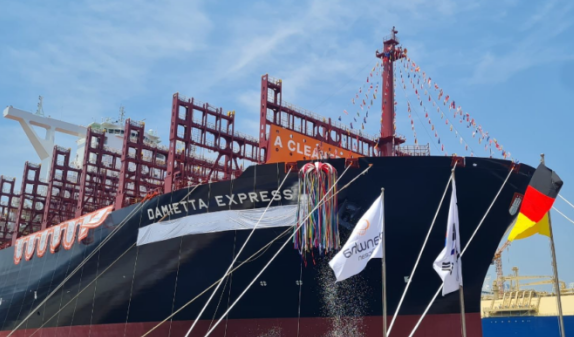
| Subject | Hanwha Ocean delivers ultra-large LNG-fueled containership “Damietta Express” to Hapag-Lloyd | ||
|---|---|---|---|
| Reg. date | 2024-05-28 | Views | 1754 |

[LNG Prime/ May 27, 2024] Germany’s Hapag-Lloyd has taken delivery of a new ultra-large LNG-fueled containership from South Korea’s Hanwha Ocean.
Hanwha Ocean, previously known as DSME, held a christening ceremony on Friday for the 23,660-teu, Damietta Express, according to Hapag-Lloyd. This is the fifth vessel to join the “Hamburg Express Class”, it said. The containership named after Egypt’s port city Damietta left Hanwha Ocean’s yard in Okpo during the weekend, its AIS data provided by VesselsValue shows.
Prior to this vessel, Hanwa Ocean delivered the 23,660-teu Singapore Express to Hapag-Lloyd. The ship and its sister vessels feature an LNG fuel tank made of Posco’s high manganese steel. Hanwha Ocean and steelmaker Posco jointly developed the tank named MCTIB (high manganese steel cargo tank independent type-B).
By using manganese, which is about ten times cheaper than nickel, the costs of the tanks are “drastically” reduced compared to existing fuel tanks which mainly use Invar (nickel alloy steel), aluminum, and stainless steel, Hanwha Ocean claims.
Hapag-Lloyd took delivery of the first of twelve LNG dual-fuel newbuilds, Berlin Express, in June last year. The company first ordered six LNG dual-fuel containerships from Hanwha Ocean in 2020, and it added six more sister vessels in 2021. The orders have a total price tag of about $2 billion. Moreover, the German shipping firm will take delivery of the remaining vessels in 2024 and all of the vessels feature MAN ME-GI main engines. They are about 400 meters long and 61 meters wide.
Besides newbuilds, Hapag-Lloyd operates the converted containership, Brussels Express, the world’s first ultra-large containership LNG retrofit. In April, this vessel completed what Hapag-Lloyd claims is the largest ship-to-ship bio-LNG bunkering operation in the Dutch port of Rotterdam.
Besides bio-LNG, Hapag-Lloyd is also working on a synthetic methane project as it looks to further reduce emissions from its fleet of LNG-powered containerships.
 HOME
HOME








